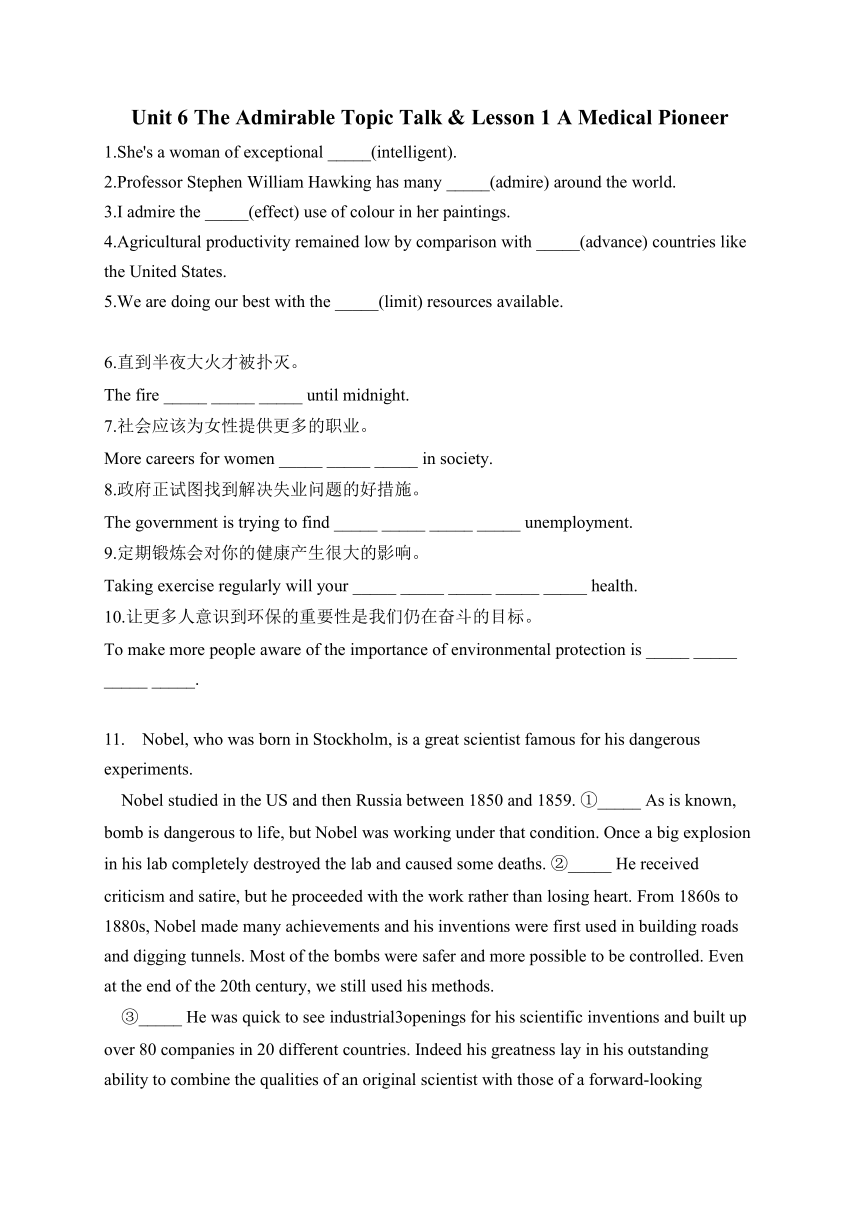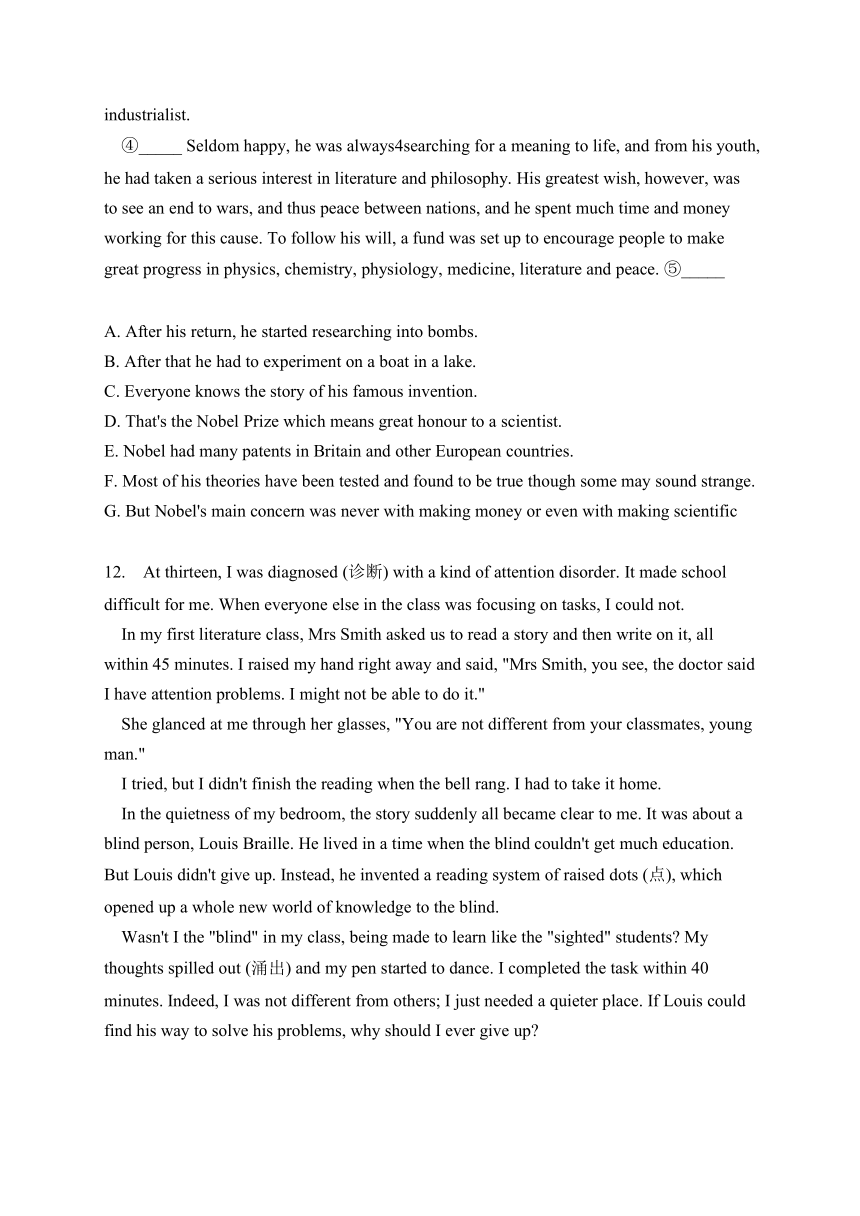北师大版(2019) 选择性必修 第二册Unit 6 The Media Topic Talk & Lesson 1 A Medical Pioneer练习(含答案)
文档属性
| 名称 | 北师大版(2019) 选择性必修 第二册Unit 6 The Media Topic Talk & Lesson 1 A Medical Pioneer练习(含答案) |

|
|
| 格式 | docx | ||
| 文件大小 | 15.4KB | ||
| 资源类型 | 教案 | ||
| 版本资源 | 北师大版(2019) | ||
| 科目 | 英语 | ||
| 更新时间 | 2024-04-03 11:03:29 | ||
图片预览


文档简介
Unit 6 The Admirable Topic Talk & Lesson 1 A Medical Pioneer
1.She's a woman of exceptional _____(intelligent).
2.Professor Stephen William Hawking has many _____(admire) around the world.
3.I admire the _____(effect) use of colour in her paintings.
4.Agricultural productivity remained low by comparison with _____(advance) countries like the United States.
5.We are doing our best with the _____(limit) resources available.
6.直到半夜大火才被扑灭。
The fire _____ _____ _____ until midnight.
7.社会应该为女性提供更多的职业。
More careers for women _____ _____ _____ in society.
8.政府正试图找到解决失业问题的好措施。
The government is trying to find _____ _____ _____ _____ unemployment.
9.定期锻炼会对你的健康产生很大的影响。
Taking exercise regularly will your _____ _____ _____ _____ _____ health.
10.让更多人意识到环保的重要性是我们仍在奋斗的目标。
To make more people aware of the importance of environmental protection is _____ _____ _____ _____.
11. Nobel, who was born in Stockholm, is a great scientist famous for his dangerous experiments.
Nobel studied in the US and then Russia between 1850 and 1859. ①_____ As is known, bomb is dangerous to life, but Nobel was working under that condition. Once a big explosion in his lab completely destroyed the lab and caused some deaths. ②_____ He received criticism and satire, but he proceeded with the work rather than losing heart. From 1860s to 1880s, Nobel made many achievements and his inventions were first used in building roads and digging tunnels. Most of the bombs were safer and more possible to be controlled. Even at the end of the 20th century, we still used his methods.
③_____ He was quick to see industrial3openings for his scientific inventions and built up over 80 companies in 20 different countries. Indeed his greatness lay in his outstanding ability to combine the qualities of an original scientist with those of a forward-looking industrialist.
④_____ Seldom happy, he was always4searching for a meaning to life, and from his youth, he had taken a serious interest in literature and philosophy. His greatest wish, however, was to see an end to wars, and thus peace between nations, and he spent much time and money working for this cause. To follow his will, a fund was set up to encourage people to make great progress in physics, chemistry, physiology, medicine, literature and peace. ⑤_____
A. After his return, he started researching into bombs.
B. After that he had to experiment on a boat in a lake.
C. Everyone knows the story of his famous invention.
D. That's the Nobel Prize which means great honour to a scientist.
E. Nobel had many patents in Britain and other European countries.
F. Most of his theories have been tested and found to be true though some may sound strange.
G. But Nobel's main concern was never with making money or even with making scientific
12. At thirteen, I was diagnosed (诊断) with a kind of attention disorder. It made school difficult for me. When everyone else in the class was focusing on tasks, I could not.
In my first literature class, Mrs Smith asked us to read a story and then write on it, all within 45 minutes. I raised my hand right away and said, "Mrs Smith, you see, the doctor said I have attention problems. I might not be able to do it."
She glanced at me through her glasses, "You are not different from your classmates, young man."
I tried, but I didn't finish the reading when the bell rang. I had to take it home.
In the quietness of my bedroom, the story suddenly all became clear to me. It was about a blind person, Louis Braille. He lived in a time when the blind couldn't get much education. But Louis didn't give up. Instead, he invented a reading system of raised dots (点), which opened up a whole new world of knowledge to the blind.
Wasn't I the "blind" in my class, being made to learn like the "sighted" students My thoughts spilled out (涌出) and my pen started to dance. I completed the task within 40 minutes. Indeed, I was not different from others; I just needed a quieter place. If Louis could find his way to solve his problems, why should I ever give up
I didn't expect anything when I handed in my paper to Mrs Smith, so it was quite a surprise when it came back to me the next day—with an "A" on it. At the bottom of the paper were these words: "See what you can do when you keep trying "
1. Why didn't the author finish the reading in class
A.He didn't have self-confidence.
B.He was not fond of literature.
C.He had an attention disorder.
D.He needed a quieter place.
2.What can we learn about Louis Braille from the passage
A.He got a good education at school.
B.He made an invention which helps the blind.
C.He gave up trying.
D.He managed to cure his blindness.
3.What was Mrs Smith's attitude to the author at the end of the story
A. Angry. B. Impatient. C. Sympathetic. D. Encouraging.
4.What is the best title of the passage
A.Keep Trying to Solve All Problems
B.How to Overcome Attention Disorder
C.A Great Teacher
D.From the "Blind" to the "Sighted"
答案
1. intelligence
2. admirers
3. effective
4. advanced
5. limited
6. wasn't put out
7. should be provided
8. a good cure for
9. make a great difference to
10. what we're fighting for
11. ABEGD
12. 1-4 CBDD
1.She's a woman of exceptional _____(intelligent).
2.Professor Stephen William Hawking has many _____(admire) around the world.
3.I admire the _____(effect) use of colour in her paintings.
4.Agricultural productivity remained low by comparison with _____(advance) countries like the United States.
5.We are doing our best with the _____(limit) resources available.
6.直到半夜大火才被扑灭。
The fire _____ _____ _____ until midnight.
7.社会应该为女性提供更多的职业。
More careers for women _____ _____ _____ in society.
8.政府正试图找到解决失业问题的好措施。
The government is trying to find _____ _____ _____ _____ unemployment.
9.定期锻炼会对你的健康产生很大的影响。
Taking exercise regularly will your _____ _____ _____ _____ _____ health.
10.让更多人意识到环保的重要性是我们仍在奋斗的目标。
To make more people aware of the importance of environmental protection is _____ _____ _____ _____.
11. Nobel, who was born in Stockholm, is a great scientist famous for his dangerous experiments.
Nobel studied in the US and then Russia between 1850 and 1859. ①_____ As is known, bomb is dangerous to life, but Nobel was working under that condition. Once a big explosion in his lab completely destroyed the lab and caused some deaths. ②_____ He received criticism and satire, but he proceeded with the work rather than losing heart. From 1860s to 1880s, Nobel made many achievements and his inventions were first used in building roads and digging tunnels. Most of the bombs were safer and more possible to be controlled. Even at the end of the 20th century, we still used his methods.
③_____ He was quick to see industrial3openings for his scientific inventions and built up over 80 companies in 20 different countries. Indeed his greatness lay in his outstanding ability to combine the qualities of an original scientist with those of a forward-looking industrialist.
④_____ Seldom happy, he was always4searching for a meaning to life, and from his youth, he had taken a serious interest in literature and philosophy. His greatest wish, however, was to see an end to wars, and thus peace between nations, and he spent much time and money working for this cause. To follow his will, a fund was set up to encourage people to make great progress in physics, chemistry, physiology, medicine, literature and peace. ⑤_____
A. After his return, he started researching into bombs.
B. After that he had to experiment on a boat in a lake.
C. Everyone knows the story of his famous invention.
D. That's the Nobel Prize which means great honour to a scientist.
E. Nobel had many patents in Britain and other European countries.
F. Most of his theories have been tested and found to be true though some may sound strange.
G. But Nobel's main concern was never with making money or even with making scientific
12. At thirteen, I was diagnosed (诊断) with a kind of attention disorder. It made school difficult for me. When everyone else in the class was focusing on tasks, I could not.
In my first literature class, Mrs Smith asked us to read a story and then write on it, all within 45 minutes. I raised my hand right away and said, "Mrs Smith, you see, the doctor said I have attention problems. I might not be able to do it."
She glanced at me through her glasses, "You are not different from your classmates, young man."
I tried, but I didn't finish the reading when the bell rang. I had to take it home.
In the quietness of my bedroom, the story suddenly all became clear to me. It was about a blind person, Louis Braille. He lived in a time when the blind couldn't get much education. But Louis didn't give up. Instead, he invented a reading system of raised dots (点), which opened up a whole new world of knowledge to the blind.
Wasn't I the "blind" in my class, being made to learn like the "sighted" students My thoughts spilled out (涌出) and my pen started to dance. I completed the task within 40 minutes. Indeed, I was not different from others; I just needed a quieter place. If Louis could find his way to solve his problems, why should I ever give up
I didn't expect anything when I handed in my paper to Mrs Smith, so it was quite a surprise when it came back to me the next day—with an "A" on it. At the bottom of the paper were these words: "See what you can do when you keep trying "
1. Why didn't the author finish the reading in class
A.He didn't have self-confidence.
B.He was not fond of literature.
C.He had an attention disorder.
D.He needed a quieter place.
2.What can we learn about Louis Braille from the passage
A.He got a good education at school.
B.He made an invention which helps the blind.
C.He gave up trying.
D.He managed to cure his blindness.
3.What was Mrs Smith's attitude to the author at the end of the story
A. Angry. B. Impatient. C. Sympathetic. D. Encouraging.
4.What is the best title of the passage
A.Keep Trying to Solve All Problems
B.How to Overcome Attention Disorder
C.A Great Teacher
D.From the "Blind" to the "Sighted"
答案
1. intelligence
2. admirers
3. effective
4. advanced
5. limited
6. wasn't put out
7. should be provided
8. a good cure for
9. make a great difference to
10. what we're fighting for
11. ABEGD
12. 1-4 CBDD
同课章节目录
- Unit 4 Humour
- Lesson 1 What’s So Funny?
- Lesson 2 Why Do We Need Humour?
- Lesson 3 My Favourite Comedian
- Unit 5 Education
- Lesson 1 Enlightening a Mind
- Lesson 2 The Objectives of Education
- Lesson 3 Understanding
- Unit 6 The Media
- Lesson 1 From Page to Screen
- Lesson 2 Questions about Media
- Lesson 3 The Advertising Game
